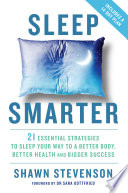

Sleep is a critical component of overall health and well-being. In 'Sleep Smarter', the author emphasizes that sleep affects every aspect of our lives, including cognitive function, emotional regulation, and physical health. The book outlines how poor sleep can lead to serious health issues such as obesity, diabetes, heart disease, and even mental health disorders. It highlights the fact that sleep is not merely a passive state but an active process that is essential for recovery and rejuvenation. The author provides evidence from scientific studies to show the correlation between adequate sleep and improved performance, creativity, and decision-making abilities. By understanding the profound impact of sleep on our daily lives, readers are encouraged to prioritize their sleep as a fundamental aspect of their overall health strategy.
Continue readingThe book outlines several practical sleep hygiene practices that can significantly improve sleep quality. These practices include establishing a consistent sleep schedule, creating a bedtime routine, and optimizing the sleep environment. The author emphasizes the importance of reducing exposure to blue light from screens before bedtime, as it can interfere with the production of melatonin, the hormone responsible for regulating sleep. Additionally, the book suggests keeping the bedroom dark, cool, and quiet to create an ideal sleeping environment. Other recommendations include limiting caffeine and alcohol intake, especially in the hours leading up to bedtime. By implementing these practices, readers can cultivate a healthier relationship with sleep, leading to better overall health and productivity.
Continue readingNutrition plays a crucial role in sleep quality, and 'Sleep Smarter' delves into the connection between what we eat and how well we sleep. The author discusses how certain foods can promote sleep, such as those rich in magnesium, tryptophan, and melatonin. He also warns against consuming heavy meals, caffeine, and sugar close to bedtime, as these can disrupt sleep patterns. The book encourages readers to consider their dietary choices as part of their sleep strategy, suggesting that a balanced diet not only supports overall health but also enhances sleep quality. By understanding the nutritional factors that affect sleep, readers can make informed choices that contribute to better rest.
Continue readingExercise is another key factor influencing sleep quality. The author explains how regular physical activity can help regulate sleep patterns and improve the depth and quality of sleep. He provides insights into the best times to exercise for optimal sleep benefits, noting that morning or early afternoon workouts can be particularly effective. However, he cautions against vigorous exercise right before bed, as it can have the opposite effect. The book encourages readers to find a balance in their exercise routines to leverage the sleep-enhancing benefits of physical activity, thereby promoting both mental and physical health.
Continue readingThe book highlights the importance of mindfulness and relaxation techniques in achieving better sleep. The author discusses various practices such as meditation, deep breathing, and progressive muscle relaxation that can help calm the mind and prepare the body for sleep. He emphasizes that stress and anxiety are significant barriers to quality sleep, and incorporating mindfulness practices into daily routines can mitigate these effects. By learning to manage stress effectively, readers can create a more conducive mental state for falling asleep and staying asleep throughout the night.
Continue readingIn today's digital age, technology plays a significant role in our sleep patterns. The author discusses how the pervasive use of smartphones, tablets, and computers can lead to sleep disruptions due to blue light exposure and constant connectivity. He provides strategies for managing technology use, such as setting boundaries for screen time in the evening and utilizing apps that promote better sleep habits. The book encourages readers to be mindful of their technology consumption, particularly in the hours leading up to bedtime, to enhance their sleep quality.
Continue readingThe final key idea in 'Sleep Smarter' is the importance of creating a personalized sleep plan tailored to individual needs and lifestyles. The author encourages readers to assess their current sleep habits, identify areas for improvement, and implement the strategies discussed throughout the book. By taking a proactive approach to sleep, individuals can develop a customized plan that addresses their unique challenges and promotes better sleep quality. The book provides tools and frameworks for tracking progress and making adjustments as needed, empowering readers to take control of their sleep health.
Continue readingThe reading time for Sleep Smarter depends on the reader's pace. However, this concise book summary covers the 7 key ideas from Sleep Smarter, allowing you to quickly understand the main concepts, insights, and practical applications in around 20 min.
Sleep Smarter is definitely worth reading. The book covers essential topics including The Importance of Sleep, Sleep Hygiene Practices, Nutrition and Sleep, providing practical insights and actionable advice. Whether you read the full book or our concise summary, Sleep Smarter delivers valuable knowledge that can help you improve your understanding and apply these concepts in your personal or professional life.
Sleep Smarter was written by Shawn Stevenson.
If you enjoyed Sleep Smarter by Shawn Stevenson and want to explore similar topics or deepen your understanding, we highly recommend these related book summaries:
These books cover related themes, complementary concepts, and will help you build upon the knowledge gained from Sleep Smarter. Each of these summaries provides concise insights that can further enhance your understanding and practical application of the ideas presented in Sleep Smarter.